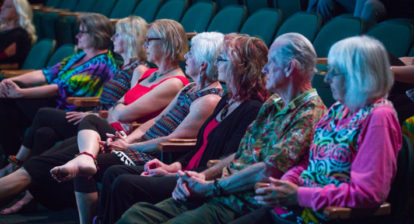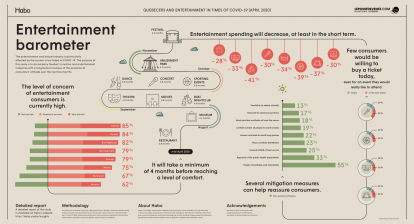Written by Lila Galipeau
The future of performing arts in Canada relies on our next generation: Gen Z. This is my generation. I am now old enough to vote, work, and buy tickets to see shows and attend festivals. During the CAPACOA Conference 2023, I took part in a fish bowl style discussion alongside other Gen Zs to discuss whether Canadian performing arts serve Gen Z and help industry leaders learn more about my generation’s engagement with arts and culture.
The event began with Emilie Bossard, Senior Analyst at Nanos Research, sharing key statistics about how Gen Z engages with performing arts. Emilie is an expert in this field of research and helped develop the Arts Response Tracking Survey (ARTS) which is the go-to source on insights in Canada’s performing arts world collecting data on everything from consumer behaviour, to volunteering, and donation habits. One interesting finding from this survey was that Gen Zs are most likely to prefer sure-thing entertainment and are more likely than other Canadians to seek out learning experiences when engaging with the arts. Take a look at the full presentation here.
After this engaging presentation, the Gen Z panel moderator, Brit Johnston (an Anishinaabekwe artist, creative producer, and community activator), took the lead and opened the space for discussion between myself and the four other Gen Z panelists: Georges, Clémentine, Britt and Sara. Here are some key takeaways from this eye-opening dialogue.
5 Insights About How Gen Zs Engage with the Performing Arts:
Insight 1: Do Gen Zs have a lot of free time?
The short answer is no. When we were asked about what we do for fun, it was clear I was not the only panelist with limited time to myself. Between school, work, and various extracurricular activities, finding time for yourself, let alone the performing arts, is a challenge as a Gen Z. This scarcity of free time makes us gravitate towards more affordable and independent art scenes, like those in Montreal, as panelist Georges pointed out. Our engagement in the arts, whether it’s through student organizations or volunteering, is often driven by a blend of personal interest and practicality.
Sara made a point that she likes to prioritize self-care and mental health in her limited free time. This further emphasized our generation’s approach to taking care of ourselves, as burnout is a big issue with Gen Z, as fellow panelist Britt mentioned.
Insight 2: What kind of shows do Gen Zs want to see?
Innovative content and shorter shows! Our generation craves innovation and relatability in the performing arts. My fellow panelist, Sara, highlighted our generation’s appreciation for more creative, yet shorter plays. This desire for shorter shows aligns with our generation’s reduced attention spans, caused by the increased usage of smartphones and social media. When our moderator asked if the quick stimulus we’re exposed to on social media has affected our attention spans, I quickly replied, “100%”.
The desire for content that is relatable to our generation and challenges traditional norms was a recurring theme. Britt gave us the example of the allure of “goblin” and gender-swap versions of Shakespeare plays offered by the Stratford festival. These are just a few examples of how performing arts organizations can capitalize on our generation’s enthusiasm for fresh takes on classic works, which allows them to appeal to new audiences while retaining their regulars.
Insight 3: Do Gen Zs like to try new things?
Our discussion revealed that Gen Z really likes to explore and try new things, even though we’re often stuck on our phones and social media. Panelist Georges’ efforts to focus on long-form content like movies, despite his preference for quick content, exemplifies this. Similarly, Sara’s practice of setting limits on the time she spends on social media, such as TikTok shows we’re not just sticking to what’s easy and familiar on our social media feeds, but we’re also looking for different, and more interesting things to do.
Later in the conversation, I brought up the idea of the “attention economy,” which is a fancy way of saying that the things that grab our attention are the most important these days. Gen Z is living in a world where their attention is one of the valuable resources in existence. Even though we’re used to quick, catchy content, we’re starting to seek out more engaging experiences than what social media can currently offer. Despite our limited attention spans, our willingness to explore and engage with the world around us, in ways not dictated by social media, shows that our generation is curious and open to new ideas and activities, especially when it comes to the performing arts.
Insight 4: How much are Gen Z willing to spend?
A key factor influencing our participation in the performing arts is cost. According to the survey, 11% of Gen Zs will usually only purchase tickets for shows if they can get a discount. Most panelists, including myself, admitted to attending live shows infrequently, mainly due to finances. With limited time for ourselves, we want to ensure any event we’re committing to is worth our time and money.
I mentioned that showing potential attendees as much about what their experience would hold as possible in advance would be beneficial. Including key details in social media ads and content helps convince potential Gen Z attendees that taking part in an activity is worth their time. We’re more inclined to invest in well-known artists or performances with a proven track record of entertainment value. However, the appeal of festivals, offering multiple artists and experiences for one price during a specific period of time, resonates strongly with our desire for time and cost-effective entertainment options.
Insight 5: How do Gen Zs plan group outings?
For Gen Z, the social aspect of attending performing arts events is important. Organizing group outings for me usually starts with the discovery of a show or event on social media (either an ad or someone posting something about it on their story), leading to discussions in group chats to gauge the interest of friends. Sara mentioned that if she can’t find any friends to partake in shows or events with her, she turns to going with family members (in her case, her mom). This smartphone powered group planning makes it obvious that organizations should invest in making it easier to buy group tickets on mobile devices in order to appeal to Gen Z.
How Gen Zs Engage with the Performing Arts
The insights gathered from this panel discussion at the CAPACOA Conference underscore the unique ways in which Gen Z engages with the performing arts. From our time constraints to our financial considerations, and the need for relatable content, it’s clear that we are reshaping the landscape of arts engagement. For the performing arts community to thrive with the support of Gen Z, adaptation and innovation are key. As we continue to make our mark on the world, our interaction with the arts will undoubtedly play a pivotal role in shaping Canada’s cultural landscape. It’s time to make the performing arts more appealing and relatable for this generation.
The session “Are You Serving Gen Z?” was sponsored by Business/Arts.








